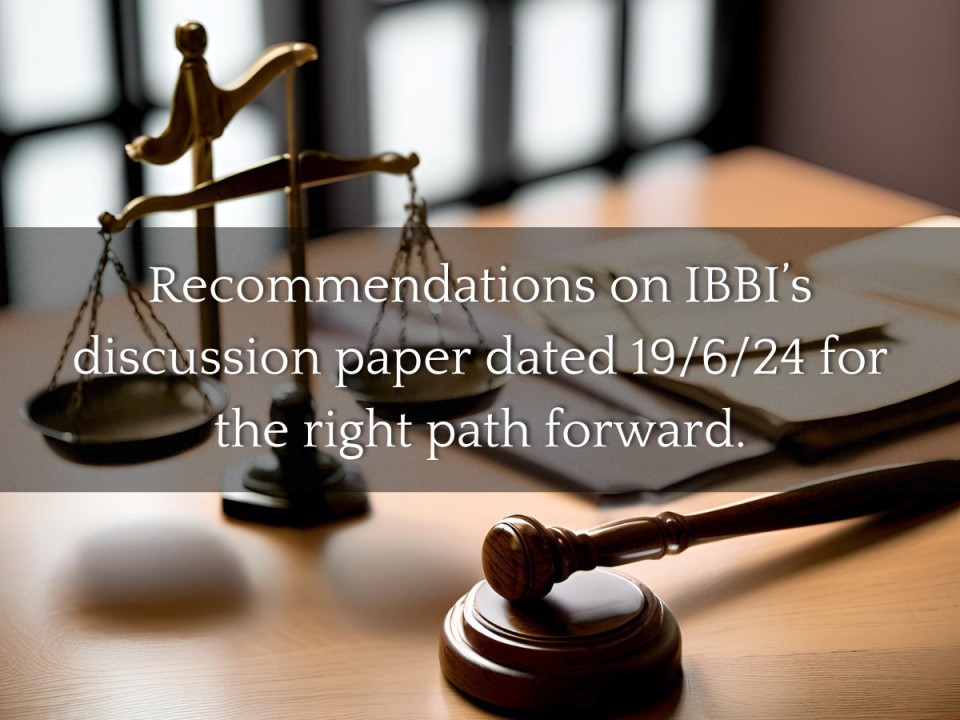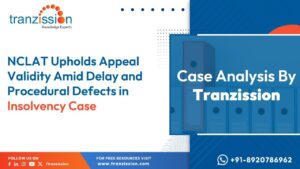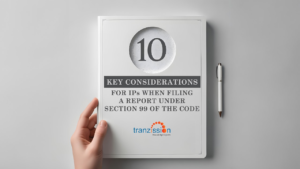
Proposed Amendments to IBBI Regulations: An In-Depth Analysis and Recommendations

Table of Contents
Introduction
The Insolvency and Bankruptcy Board of India (IBBI) has recently issued a discussion paper on proposed amendments to the Insolvency and Bankruptcy Board of India (Insolvency Resolution Process for Corporate Persons) Regulations, 2016. This paper, dated June 19, 2024, aims to solicit feedback on several key issues related to valuation, representation, and the treatment of guarantees in the insolvency resolution process. This article will explore the current practice and proposed amendments, evaluate their potential benefits and drawbacks, and provide recommendations for effective implementation.
Key Proposals and Their Analysis
1. Registered valuer to submit valuation report for the Corporate Debtor (CD) as a whole.
Current Practice:
The accurate valuation of the assets of the CD holds a significant place in the outcome of the CIRP as it maximises recovery for creditors, facilitates informed decision-making, and ensures fairness for all stakeholders.
Two registered valuers (RVs) are appointed to determine the fair value and liquidation value of the Corporate Debtor (CD). If these valuations differ significantly, a third RV may be appointed.
Proposed Amendment:
To streamline the process and remove ambiguities, the amendment proposes aligning the CIRP regulations with the Companies (Registered Valuers and Valuation) Rules, 2017, by allowing a single RV to conduct valuations, with the option to obtain inputs from other RVs as needed.
Pros of Proposed Amendment:
- Streamlined Process: This approach simplifies the valuation process and potentially reduces the number of valuers required.
- Cost Efficient: By reducing the number of valuers, the costs associated with valuations are likely to decrease.
- Consistency: Aligning the regulations reduces inconsistencies between different sets of rules.
Cons of Proposed Amendment:
- Risk of Inaccuracy: Relying on a single valuer increases the risk of inaccuracies if the valuer’s methodology or inputs are flawed.
- Dependency on Sub-Valuers: Relying on inputs from other valuers may lead to delays or inconsistencies due to differing valuation approaches.
2. One valuation estimate for companies up to a certain asset size and for MSME companies.
Current Requirement:
Currently, two RVs are appointed within 7 days (but no later than the 47th day from the insolvency commencement date). They determine the fair value and liquidation value of the CD and a third RV if valuations differ significantly.
Proposed Amendment:
For CDs with assets up to ₹1000 crore and MSMEs, only one RV will be appointed by default. The Committee of Creditors (CoC) may opt for two RVs if necessary, recording the reasons for such a decision.
Pros of Proposed Amendment:
- Cost Reduction: Cost reduction for smaller companies and MSMEs.
- Expedited Process: Simplifies and speeds up the insolvency process for smaller entities.
Cons of Proposed Amendment:
- Potential for Inaccurate Valuation: A single valuer might not capture the full complexity of larger asset portfolios.
- Reduced Checks and Balances: Having only one valuation may miss discrepancies that two valuations could uncover.
3. Voting by authorised representative before appointment by the Adjudicating Authority.
Current Issue:
The appointment of ARs is a lengthy process, starting from IRP identifying the class of creditors to AA appointing the AR before the first meeting of the CoC. This delay in the appointment of ARs can prevent creditors in a class from being represented in CoC meetings.
Proposed Amendment:
Allow the interim IP chosen by the majority of financial creditors (FCs) in a class to attend CoC meetings and perform duties from the date of application for appointment until confirmation by the Adjudicating Authority (AA).
Pros of Proposed Amendment:
- Continuous Representation: Ensures creditors are represented in CoC meetings without delay.
- Enhanced Creditor Rights: Protects the rights of creditors to participate in important decisions from the onset.
Cons of Proposed Amendment:
- Potential Legal Challenges: Interim actions by an unconfirmed AR might face legal challenges if the AA later decides not to confirm the AR’s appointment.
- Administrative Complexity: Managing the interim period responsibilities of the AR might add complexity to the process.
4. Release of guarantees in the resolution plan.
Current Issue:
Judicial authorities have issued multiple, sometimes contradictory, orders regarding the treatment of guarantees in a resolution plan. This has led to uncertainty about whether the approval of a resolution plan for a Corporate Debtor (CD) automatically releases its guarantors from liability.
Proposed Amendment:
To address this ambiguity, amend CIRP regulations to clarify that a resolution plan does not extinguish the rights of creditors to proceed against guarantors.
Pros of Proposed Amendment:
- Clarity and Consistency: Provides clear guidelines on the treatment of guarantees, aligning with the Supreme Court’s decision in Lalit Kumar Jain v. Union of India.
- Protection for Creditors: Ensures creditors can enforce their rights against guarantors, providing an additional layer of security.
Cons of Proposed Amendment:
- Commercial Wisdom of CoC Disappears:It is not aligned with Supreme Court’s judgments on CoC’s commercial wisdom supremacy. Intricate cases may require this and this flexibility should not be taken away.
- Legal Disputes: The provision might lead to increased litigation as guarantors seek to challenge their ongoing liability.
Recommendations
While the proposed amendments offer significant benefits, careful consideration and implementation of additional safeguards are necessary to address potential issues and ensure the reforms achieve their intended outcomes.
- Enhanced Oversight: Implement additional oversight mechanisms to ensure the accuracy of single valuer reports. Regular audits and quality checks can help mitigate the risks of inaccuracies.
- Clear Guidelines: Provide clear, detailed guidelines for interim AR responsibilities to minimise potential legal challenges. This will help ensure smooth administration and avoid complications during the interim period.
- Stakeholder Engagement:Engage with stakeholders, particularly guarantors, to address concerns and mitigate potential litigation risks.
Conclusion
The IBBI’s proposed amendments to the insolvency resolution process regulations aim to improve efficiency, reduce costs, and provide clearer guidelines for various aspects of the process. While these proposals have several advantages, potential issues could arise from the changes in valuation practices, interim AR responsibilities, and the treatment of guarantees. By implementing additional safeguards and engaging with stakeholders, these amendments can significantly enhance the effectiveness of the insolvency resolution process in India.





